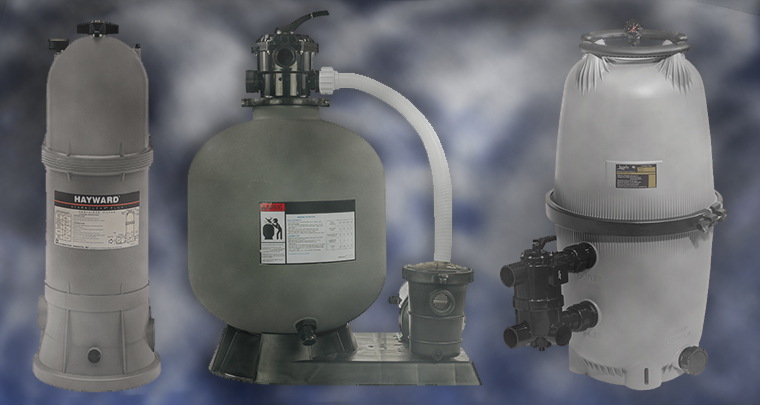
Pool filters are your primary line of defense when it comes to keeping your swimming pool water clean. Water temporarily leaves your swimming pool through the pool’s skimmer, being moved by the pool pump into your filter. Dirt, hair, grass, body oils, and other impurities are all removed by this process, leaving you with clear, inviting water that is pumped back into your pool for when you’re ready to swim.
There are three major types of pool filters: sand, cartridge and DE. While the basic principle behind each is quite similar, each filter type offers its own unique pros and cons.
Pool water is pumped into the filter tank and through a bed of filter sand. Impurities in the water get caught up in the sand as the water passes through to tubes at the bottom of the filter and returned to the pool.
In order to clean the debris out of the filter sand, the filter must be backwashed, a manual process which removes the particles and debris. Backwashing is necessary to maintain the filter’s effectiveness, as well as prevent the pressure in the tank from building up to unsafe levels.
There are also options for filter media besides sand that work with sand filters. Alternative media include recycled glass and Zeo-Clear, which can improve filter efficiency. Just make sure to use an alternative media that is designed to be used with a sand filter.
Pros
Cons
Cartridge filters work similarly to an automobile’s air filter, in which your pool water passes through a filter element. Pool filter cartridges are plastic-framed cylinders of pleated fabric. The sizes of these cartridges vary from model to model, so it’s important to get the right size cartridge for your filter.
As the water runs through the filter, particles are caught by the fabric while the water passes through and back to the pool. In lieu of backwashing, the filter cartridge can be removed from the filter and hosed down to remove the collected debris.
Pros
Cons
Fossilized algae known as diatoms are ground up into a powder, forming what we call Diatomaceous Earth (or DE for short). The DE powder is mixed into the filter and coats a filter “grid”, which then collects particles when your pool water is run through the filter. This powder is finer than sand, meaning that a DE filter can filter out smaller particles than a sand filter is able to collect.
A DE filter is cleaned out by backwashing, just like a sand filter. Small amounts of DE powder can remain in the filter after backwashing, so an annual cleaning of your filter is recommended
Pros
Cons